Apple iOS 5 Review
by Vivek Gowri, Andrew Cunningham, Saumitra Bhagwat & Brian Klug on October 18, 2011 3:05 AM ESTiPhone 3G users may remember what using iOS 4.0 was like on those phones when it was first released - it reduced performance to the extent that fixing this slowness merited a bullet point during Apple's iOS 4.1 reveal, and we found that even that didn't fix all of the problems. Will iOS 5 make the older devices on the support list similarly slow, or can we upgrade without worrying?
iPhone 3GS and Third Generation iPod Touch
The iPhone 3GS came out just over two years ago, and while it's getting a little long in the tooth its performance under iOS 5 is pleasantly surprising. Generally speaking the 3GS seems to be running just as quickly as it did with iOS 4.3, and it’s missing just a handful of features included on higher-end devices: Location-based Reminders (on the 4 and 4S), WiFi Personal Hotspot (introduced for the Verizon iPhone 4 and extended to the GSM iPhone 4 in iOS 4.3, no doubt because the 3GS uses a BCM4325 for WiFi and the iPhone 4 uses a BCM4329), and Siri (an iPhone 4S exclusive) are among the most notable. 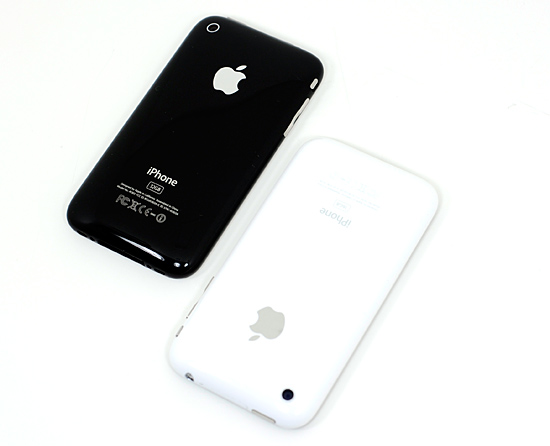
The big stuff is there, though, and it’s because the performance and feature gap between the 3GS and the rest of Apple’s lineup isn’t nearly as wide as the gap between the 3G and the then-current lineup at the time of iOS 4’s release. The 3GS’s Cortex A8 uses the same ARMv7 instruction set as the later A4 and A5 chips, while the 3G used the same ARMv6-capable Samsung S5L8900 SoC as the original iPhone. The 3GS has 256MB of RAM, the same as the original iPad and the currently-shipping fourth-gen iPod Touch, while the 3G had only 128MB. You get the picture - the 3GS’s upgrades relative to the 3G (which impressed us when the phone was originally released) has given it longer legs than its predecessor (and we’ll probably be saying similar things about the 4S in a couple of years).
We've already seen that JavaScript performance in Safari is better in iOS 5, but app launch times are another important metric. To get these numbers, we went back to our iOS 4.1 performance evaluation and repeated the same tests under the newer version. The phone was loaded with a fresh iOS 5 install, and all apps had been cleared from the multitasking tray. Our tests found that, most of the time, app launch speed was as fast or a bit faster than under iOS 4.1.
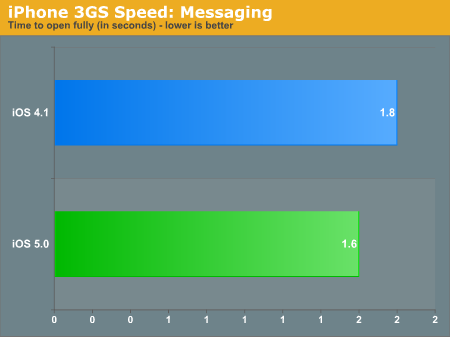
This is the time between when the Messages app was launched and when the app was ready for text entry. iOS 5 just edges out iOS 4.1 in this case.
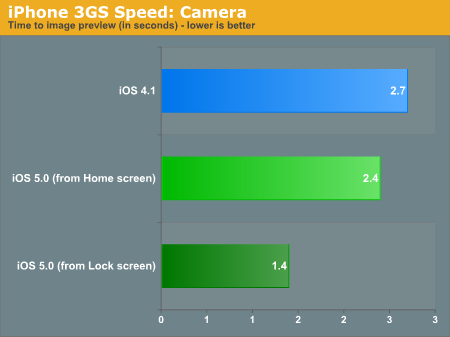
This is the time between when the Camera app was launched and when you could actually take pictures with it. From the Home screen, iOS 5 edges out iOS 4.1, and the time is consistently reduced by almost half when launched from the Lock screen - in order to reduce launch times, iOS 5 apparently does some preloading when the Home button is tapped twice (I also found this to be true on a fourth gen iPod Touch, though the difference was less pronounced).
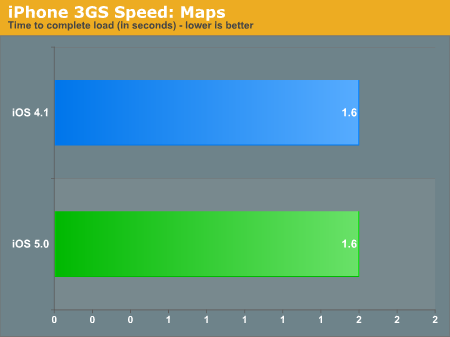
No changes here - the Maps app launches and is ready for input in the same amount of time as in iOS 4.1.
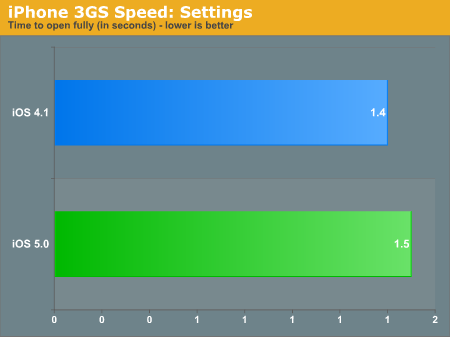
The Settings app launched slightly more slowly in iOS 5 than in iOS 4.1, but it's a change you'll notice only if you're timing it with a stopwatch.
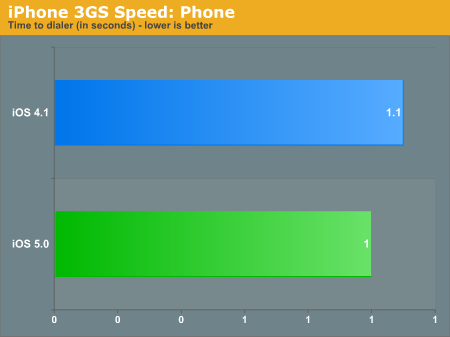
Another small variance from iOS 4.1 - in practice, the Phone dialer is ready to use pretty much instantaneously.
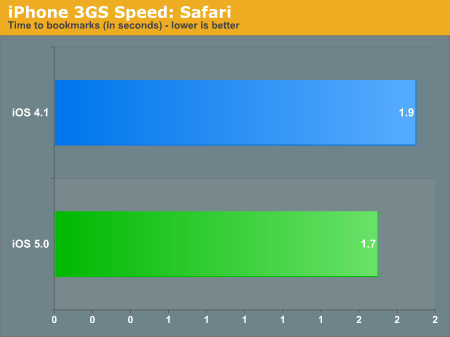
This is the amount of time between the launch of the Safari app and when the Bookmarks list popped up. iOS 5 brings a small improvement over iOS 4.1.
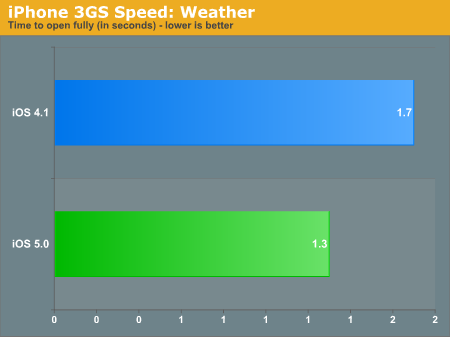
iOS 5 brings up Cupertino's weather marginally more quickly than in iOS 4.1.
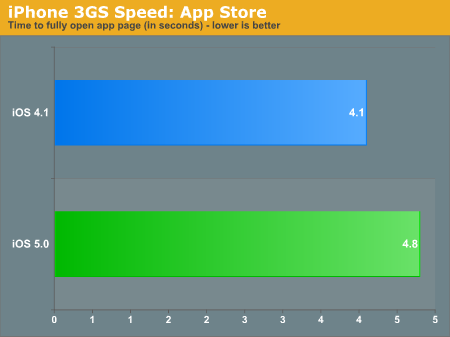
For this test, we looked up an app that had already been installed to the phone, closed the App Store, cleared it from the multitasking tray, re-opened the app, and waiting for the app's page to load again. It should be noted that while most other tests timed pretty consistently across multiple runs, we encountered the most variance between runs in this test - results were as low as 4.0 seconds and as high as 6.1 seconds. To get a reasonably representative number here, we did ten runs and averaged the results. The majority of the time, you're looking at a slight slowdown in the App Store compared to iOS 4.1.
If you've bought an iPhone 3GS since the iPhone 4 was introduced (or if you’re getting one for free now), you're not going to get burned the way that people who bought a 3G in the spring of 2010 did. The 3GS lacks the processing oomph of newer handsets, but is still mercifully responsive to user input. Apps launch quickly. Text entry is lag-free. The 3GS’s hardware and the extra time that Apple has had to optimize iOS 5 make upgrading easy to recommend, and the app launch and JavaScript benchmarks relative to iOS 4 back that up.
First generation iPad
The original iPad has the same Apple A4 SoC as the iPhone 4, but like the 3GS and third and fourth gen iPod Touches, it has only 256MB of memory. This doesn’t really hold it back though - iOS 5 seems to be pretty similar to iOS 4 from a hardware requirement standpoint, unlike the jump from iOS 3 to iOS 4.
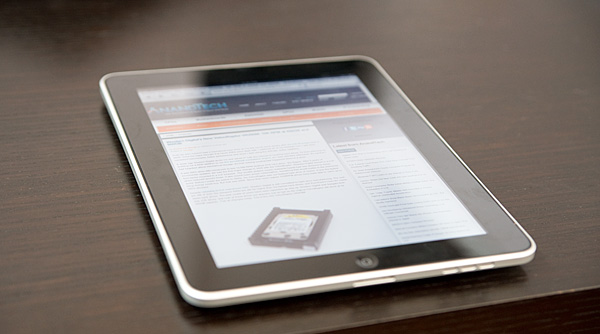
Basically everything that’s been updated in the iPad 2 version of iOS 5 makes the jump back to legacy; the notifications center, iMessage, iCloud, updated versions of Safari, Mail and Music, etc. Things that don’t make it include the camera and FaceTime updates (for obvious reasons), the new four-finger multitouch gestures (though other single finger swipe-based gestures still work), AirPlay mirroring (due to hardware requirements), and the ability to play 1080p video (also due to hardware requirements).
All of Apple’s devices running Cortex/ARM v7 processors are supported by iOS 5, and based on our findings with the iPhone 3GS and the original iPad, they’re more than capable of running it well.










86 Comments
View All Comments
simi13 - Tuesday, October 18, 2011 - link
I could swear I am on 9to5mac.com (I read anand and that daily), hahaha. A very nice review, though.MobiusStrip - Tuesday, October 18, 2011 - link
It does fail to mention a glaring omission in the OS, though: repeating, AUDIBLE notifications of MISSED CALLS.This was inexcusable in version 1, but after five or six years, Apple's phone still lacks an important, common-sense feature that was found on cell phones in the '90s. Aren't people sick of missing time with their friends and families because they didn't find out they called until the next day?
Your phone is on its charger on your dresser, and you're taking a shower when someone calls; the phone gives one little chirp immediately after the call and never again. WTF? If you missed the call, it stands to reason that you're going to miss a single noise right after it. The thing should (OPTIONALLY) notify you periodically that someone called, until you cancel the notification.
Even more bafflingly, Apple added repeat-notification controls for TEXTS. So if there's an emergency in my family and my parents want to get in touch with me, we're assuming they'll TEXT me? Brilliant, Apple. You have to wonder what kind of retards make these decisions over there.
eallan - Tuesday, October 18, 2011 - link
I hope Apple adds the option for people that want it, but man, that is one specific complaint.I don't think I've ever wanted the feature. Just wake your phone up after a shower? Whats the big deal?
I think that may be the most rare complaint about iOS. Hardly makes them "retards" for not adding a specific niche feature. Relax
Booster - Tuesday, October 18, 2011 - link
"I don't think I've ever wanted the feature. Just wake your phone up after a shower? Whats the big deal?I think that may be the most rare complaint about iOS. Hardly makes them "retards" for not adding a specific niche feature. Relax"
Sorry man, but it IS a big deal. Who in the hell would want to wake his phone periodically? Don't you realize how stressful this is? You'll never get to 'relax' knowing someone might have called or texted you etc. You'll be constantly checking out your iPhone and over time this will drive you crazy. Not a small matter by any means and surely not 'niche', since every freaking user suffers from this.
If iPhones were really that good, they'd have a dedicated LED indicator for missed events and sufficient options to customize alerts, but they would be off by default so idiots wouldn't complain that their iPhone is bugging them. Leave it disabled by default, that's fine, might even add a warning before activating alerts, but this feature just needs to be there, man.
Bob-o - Tuesday, October 18, 2011 - link
> If iPhones were really that good, they'd have a dedicated LED indicatorAgreed. It was only last weekend, when my neighbor was showing off her new 4S, that I realized you couldn't just look over at the phone to see if you have a txt/email/voicemail waiting for you. Something my Treo 650 used to do just fine.
As great as new phones are, it is amazing how some of them have taken steps backwards in many little ways.
robco - Tuesday, October 18, 2011 - link
That's all well and good if you're home alone, your phone rings, you aren't available, you find out when you return. However, I do recall back in the day, being in a public place, someone's phone rings in their purse or jacket, they're off in the bathroom or in a meeting or something. Not only do you have to listen to their phone ringing, but then you have to listen to the audible beep every so often and that can get quite annoying. Convenient for you, not always convenient for those around you.Honestly, get into the habit of checking the phone when you've been away and out of earshot. One quick tap on the sleep/wake button will let you know if you've missed something. Otherwise yours is the phone people are going to want to smash with a sledgehammer because it's beeping every few seconds.
Booster - Tuesday, October 18, 2011 - link
"Honestly, get into the habit of checking the phone when you've been away and out of earshot. One quick tap on the sleep/wake button will let you know if you've missed something. Otherwise yours is the phone people are going to want to smash with a sledgehammer because it's beeping every few seconds."I'm more concerned with my personal psychologic wellness rather than with what irritates the others. Then again, why not include the feature but disable it by default? Morons won't even care to enable the cornerstone feature of any mobile device, but those who care - they will.
You probably don't realize how retarded the 'quick tap' concept is, how extremely inconvinient for the user. Why should he or she pimp the damn square button every now and then? There is just no excuse for not really caring about end users.
snuuggles - Wednesday, October 19, 2011 - link
Hmmm, I think you are too-quickly dismissing a valid point. I mean, there are actual laws about car alarms that go off repeatedly because they are so amazingly annoying. I think your repeated noise idea is along the same line. A dedicated light might be a better compramise.Honestly, you seem a little unhinged, I somehow doubt that adding this single notification feature will allow you to have better "personal psychological wellness."
Maybe you should get rid of the phone if it's that important. Unless you are a doctor or the president, being reachable isn't *that* important.
kezeka - Thursday, October 20, 2011 - link
I am in medical school and I can personally vouch against doctors wanting to be within earshot. If we aren't on call (you would have a pager for this) then there is no reason to constantly check the phone. There are instances where I can see it being necessary.That said, I leave my phone completely silenced all day, every day and just check it periodically to see if anyone has tried to contact me. If they have, I call them back. It isn't worth breaking your concentration to be completely on top of things (insert link to any number of articles suggesting the human brain is horrible at multitasking here).
name99 - Thursday, October 20, 2011 - link
I actually am with MobiusStrip here. Different people use their phones in different ways, and I'd appreciate a more aggressive reminding of missed calls.A similar problem (which I reported as a bug a year ago, but which is still not fixed) is audible notification of text messages. Suppose you have your phone connected to a BT headset or headphones, and a call comes through. The phone is smart enough to realize that it should still ring the phone speaker because you may not actually have the headset or headphones plugged in. But it does not extend that same level of intelligence to other notifications, most obviously text messages --- but I think also Skype or Viber calls.